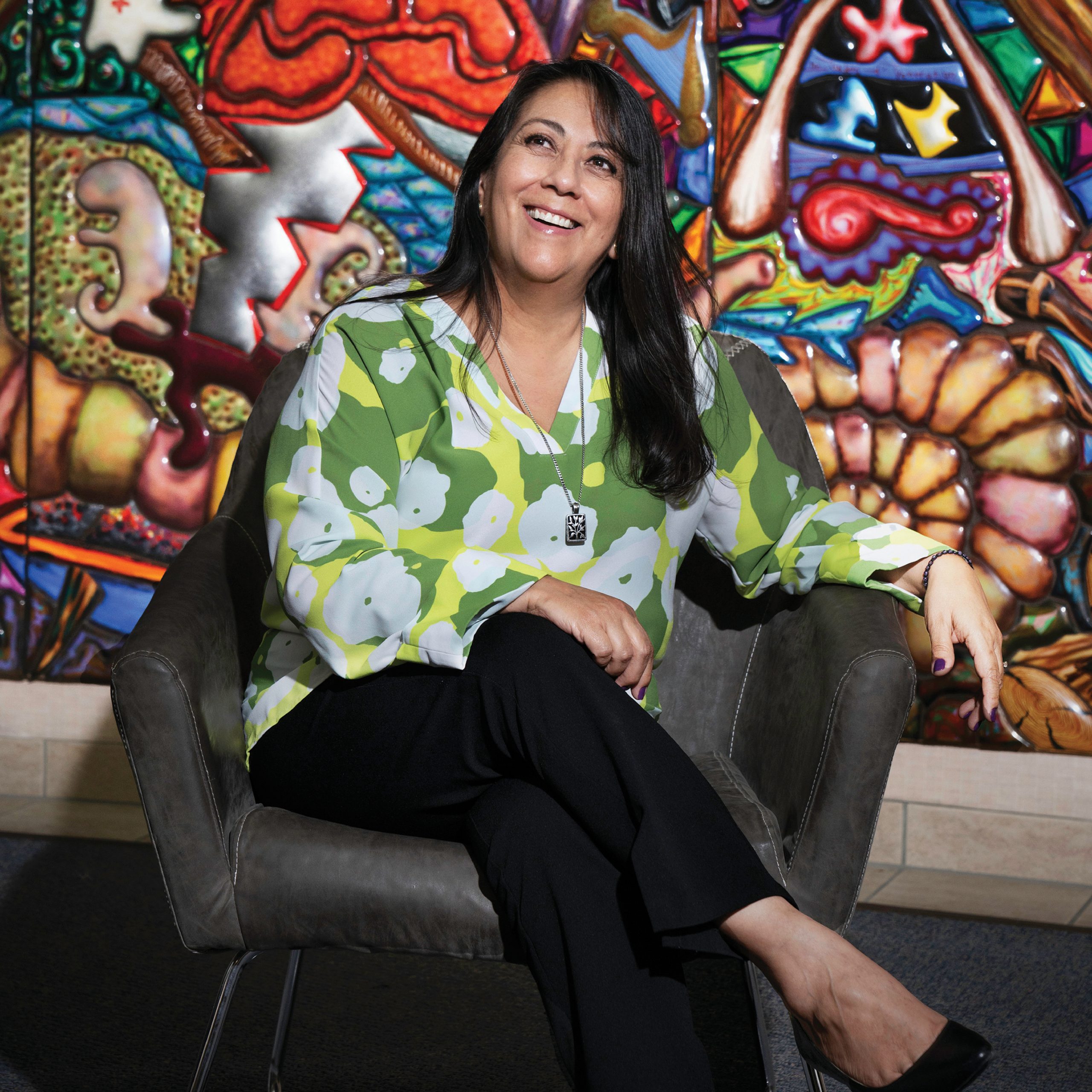
When to Serve is Your Life's Passion
Director of Social Services Zayda Welden celebrates 27 years at DAP Health in 2023
Words by Rory Taylor
Photo by Donato Di Natale
“I’ve always wanted to work with chronic illness,” reveals longtime DAP Health employee Zayda Welden. “So, when I had the opportunity to work with this group of individuals with this horrendous disease at that time — HIV/AIDS in the early ’90s — I was very interested.” Today, after more than 27 years, Welden is one of DAP Health’s most senior employees, and is still doing what she loves — caring for other people.
An Ecuadorian native, Welden had been working previously at a farmworkers’ clinic — El Progreso Del Desierto — in the Coachella Valley.
“No one wanted to run this subcontracted program to manage HIV-positive individuals,” she recalls. “Everybody was afraid. So, I told my boss, ‘Let me run it.’”
Through that position, Welden was introduced to the Desert AIDS Project (as DAP Health was then known), and when her previous clinic closed, the nonprofit offered her a job as a case manager. Welden remembers her first day on the job. “When El Progreso closed, I brought all these clients with me so they wouldn’t end up without care. I remember it was February 20, 1996.”
Since then, she’s had the chance to see DAP Health grow and change along with cultural attitudes toward queerness and HIV stigma. Welden’s also moved up the ranks, from case manager to director of social services — a role she helped reshape so as to better allow for time with her family. But over the years, the biggest change she’s seen has been in patient outcomes. “HIV infection, for the most part, is now a very manageable condition,” she says, “if you partner with your primary care physician and stick to your treatment.”
As with any chronic condition, the goal of treatment is quality of life. Now, as director of social services, that’s the mission Welden oversees:
“Food equals health, housing equals health, transportation equals health. We need to address all the determinants of health that negatively impact our patients.”
Food services for HIV-positive patients and clients has been a staple of DAP Health for years, but as the organization’s clientele has expanded, clinicians and case managers have encountered more and more food insecurity. Now, through a partnership with the local FIND Food Bank and other funders, immediate food distribution and referrals to other food banks is a default part of DAP Health’s care. “Every single patient that gets to see a clinician is asked a series of questions,” says Welden, “including, ‘Have you eaten today?’ ‘Do you have food for today?’ ‘Would you like to have a bag of basic staples for the next couple of days?’” Every patient who’s in need of food leaves the clinic with a grocery bag to last for the next two or three days, along with other community food resources information.
For HIV-positive patients and clients, even more resources are available. One such patient is Brett Ward, a Palm Springs resident who went to DAP Health for information and medical care after his partner passed away from AIDS complications. With two kids to care for and his own disability, his case manager helped him find access to more than just food assistance. “At the holidays, they would give gift cards to my children,” says Ward. “They give gift cards for the beginning of school, for school supplies. They’ve helped me a lot, as far as the extras and now the costs of being a single dad… I was using [a program] where they reimburse you for gas mileage and such. I use them for dental because I don’t have dental insurance.”
Lack of health insurance is unfortunately not an uncommon problem in the Coachella Valley, with 15% of those 16–94 years of age living without, compared to the 10% state average. Combating that kind of disparity, with everything from sliding scale payments to providing housing, is the core of DAP Health’s social services programs. Welden says everything they do is to keep clients in care. “Treatment adherence is so important,” she maintains. “We’re trying to help them with rent, with a bus pass to come to the doctor, and with food so they can keep taking their medication.”
Welden adds that housing insecurity is also one of the major roadblocks to consistent and effective care. “Just 20 miles east of Palm Springs, we have one of the poorest areas in our state. We have migrant workers who live under trees who are not housed, who have to go to work the next day.”
To better aid those individuals, the Vista Sunrise I housing complex, with 80 units, was opened for HIV-positive clients in 2007. With the success of that first initiative, Vista Sunrise II is now underway, which will make 61 more units available, not only to HIV-positive individuals, but to anyone who meets the low-income threshold.
On top of that, Welden says she has something new in mind for Vista Sunrise II: “I’m planning to hire a housing case manager who will be able to do the same things case managers do with an HIV-positive caseload. They’ll oversee the residents of those 61 new units and improve their social determinants of health, whether it’s providing service or assisting in other ways. We’re not just going to drop people in the housing and say, ‘Okay, pay your rent on time, keep it clean, and see you later.’”
Clearing roadblocks to health care is at the core of DAP Health’s mission. “We are here to improve the well-being of every member of our community,” Welden concludes. “Our mission has not changed. Before, it was focused on HIV/AIDS. Now, it’s open to whoever needs us. Providing the widest safety net possible. That’s what DAP Health is all about.”








